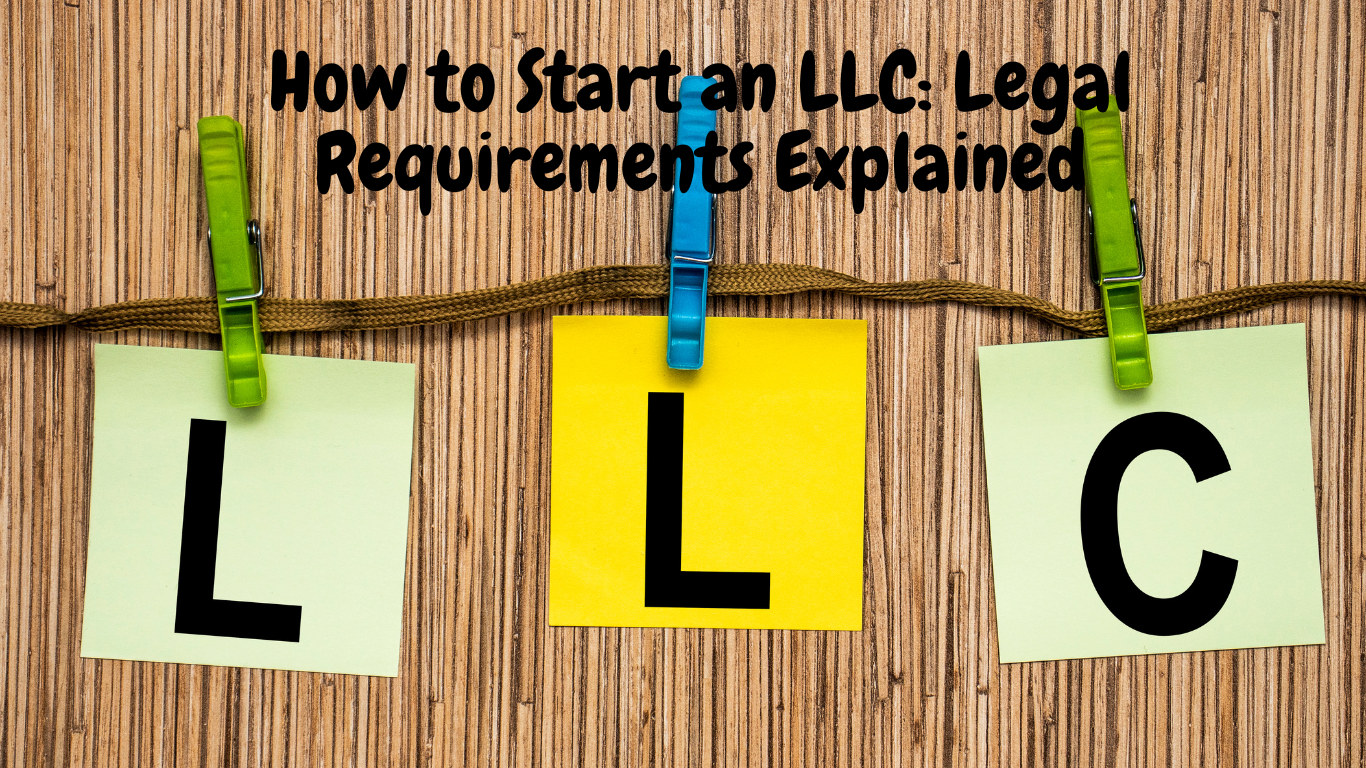Starting a Limited Liability Company (LLC) is a popular choice for entrepreneurs and small business owners due to its flexibility, tax advantages, and liability protection. An LLC combines the benefits of a corporation and a partnership, offering personal asset protection while allowing for pass-through taxation. However, forming an LLC involves several legal steps and requirements that vary by state. This comprehensive guide will walk you through the process of starting an LLC, explaining the legal requirements and providing practical tips to ensure your business is set up correctly.
1. Understanding the Basics of an LLC
1.1. What is an LLC?
A Limited Liability Company (LLC) is a business structure that provides limited liability protection to its owners, known as members. This means that members are not personally liable for the debts and liabilities of the LLC. Additionally, an LLC offers flexibility in management and taxation, making it an attractive option for many businesses.
1.2. Benefits of Forming an LLC
- Limited Liability Protection: Members are not personally responsible for the LLC’s debts and liabilities.
- Pass-Through Taxation: Profits and losses are passed through to members’ personal tax returns, avoiding double taxation.
- Flexibility in Management: LLCs can be managed by members or appointed managers.
- Credibility: Forming an LLC can enhance your business’s credibility with customers, vendors, and partners.
1.3. Drawbacks of an LLC
- Formation and Maintenance Costs: There are costs associated with forming and maintaining an LLC, including filing fees and annual reports.
- State-Specific Regulations: LLC regulations vary by state, which can complicate the formation process.
- Self-Employment Taxes: Members may be subject to self-employment taxes on their share of the profits.
2. Choosing a Business Name
2.1. Name Availability
The first step in forming an LLC is choosing a unique business name. The name must comply with your state’s LLC naming requirements, which typically include:
- Including the words “Limited Liability Company” or the abbreviation “LLC.”
- Avoiding restricted words (e.g., “Bank,” “Insurance”) that may require additional licensing.
- Ensuring the name is distinguishable from other registered business names in the state.
2.2. Name Reservation
Most states allow you to reserve your chosen business name for a limited period (usually 60-120 days) by filing a name reservation application and paying a fee. This can be useful if you’re not ready to file your LLC formation documents immediately.
2.3. Domain Name and Trademark
Consider securing a domain name that matches your business name and checking for potential trademark conflicts. Registering a trademark can provide additional protection for your brand.

3. Appointing a Registered Agent
3.1. Role of a Registered Agent
A registered agent is a person or entity responsible for receiving legal documents, such as lawsuits and government correspondence, on behalf of the LLC. The registered agent must have a physical address in the state where the LLC is formed and be available during normal business hours.
3.2. Choosing a Registered Agent
You can appoint yourself, another member, or a professional registered agent service. Using a professional service can provide privacy and ensure that important documents are handled promptly and professionally.
4. Filing Articles of Organization
4.1. What are Articles of Organization?
The Articles of Organization (also known as a Certificate of Formation or Certificate of Organization) is the legal document that formally creates your LLC. It must be filed with the appropriate state agency, usually the Secretary of State or Division of Corporations.
4.2. Required Information
The information required in the Articles of Organization varies by state but typically includes:
- LLC name
- Principal office address
- Registered agent’s name and address
- Names and addresses of members or managers
- Purpose of the LLC (some states require a general statement, while others allow a broad purpose clause)
- Duration of the LLC (if not perpetual)
4.3. Filing Fees
Each state charges a filing fee for the Articles of Organization, ranging from 50��500. Some states also offer expedited processing for an additional fee.
5. Creating an Operating Agreement
5.1. Importance of an Operating Agreement
An Operating Agreement is a legal document that outlines the ownership and operating procedures of the LLC. While not required in all states, it is highly recommended to have one in place to:
- Define members’ roles and responsibilities
- Establish profit and loss distribution
- Set rules for meetings and voting
- Outline procedures for adding or removing members
- Specify what happens if the LLC is dissolved
5.2. Drafting the Operating Agreement
You can draft an Operating Agreement yourself, use an online template, or hire an attorney to create a customized agreement. The agreement should be signed by all members and kept with your LLC’s records.
6. Obtaining an EIN
6.1. What is an EIN?
An Employer Identification Number (EIN) is a unique nine-digit number assigned by the Internal Revenue Service (IRS) to identify your LLC for tax purposes. It is also known as a Federal Tax Identification Number.
6.2. When is an EIN Required?
An EIN is required if your LLC:
- Has more than one member
- Plans to hire employees
- Files certain tax returns (e.g., excise, employment)
- Opens a business bank account
6.3. Applying for an EIN
You can apply for an EIN online through the IRS website, by fax, or by mail. The online application is the fastest method, and you will receive your EIN immediately upon completion.
7. Complying with State and Local Requirements
7.1. Business Licenses and Permits
Depending on your industry and location, your LLC may need to obtain various business licenses and permits to operate legally. These can include:
- General business license
- Professional licenses (e.g., for doctors, lawyers, contractors)
- Health and safety permits
- Zoning and land use permits
7.2. Annual Reports and Fees
Most states require LLCs to file an annual report and pay a fee to maintain good standing. The report typically includes updated information about the LLC, such as the names and addresses of members and the registered agent.
7.3. State Taxes
LLCs may be subject to state taxes, such as income tax, sales tax, and franchise tax. The specific tax requirements vary by state, so it’s important to research and comply with your state’s tax laws.
8. Opening a Business Bank Account
8.1. Importance of a Separate Bank Account
Opening a separate business bank account is crucial for maintaining the limited liability protection of your LLC. It helps keep your personal and business finances separate, making it easier to manage your finances and comply with tax requirements.
8.2. Required Documents
To open a business bank account, you will typically need:
- EIN
- Articles of Organization
- Operating Agreement
- Business license (if required)
- Identification for all members
9. Understanding Tax Obligations
9.1. Federal Taxes
By default, the IRS treats an LLC as a pass-through entity for tax purposes. This means that the LLC itself does not pay federal income tax; instead, profits and losses are passed through to the members, who report them on their personal tax returns.
9.1.1. Self-Employment Taxes
Members of an LLC are generally considered self-employed and must pay self-employment taxes (Social Security and Medicare) on their share of the profits.
9.1.2. Electing Corporate Taxation
An LLC can choose to be taxed as a corporation by filing Form 8832 with the IRS. This may be beneficial in certain situations, such as when the LLC wants to retain earnings within the company.
9.2. State Taxes
State tax obligations for LLCs vary widely. Some states impose an annual franchise tax or a flat fee, while others tax LLC income at the corporate tax rate. Be sure to research your state’s specific tax requirements.
9.3. Sales Tax
If your LLC sells goods or services subject to sales tax, you will need to register for a sales tax permit and collect sales tax from customers. The collected tax must be remitted to the state on a regular basis.
10. Maintaining Compliance and Good Standing
10.1. Record-Keeping
Maintaining accurate and organized records is essential for the smooth operation of your LLC and for complying with legal and tax requirements. Important records to keep include:
- Articles of Organization
- Operating Agreement
- Meeting minutes (if applicable)
- Financial statements
- Tax returns and filings
10.2. Annual Reports
Most states require LLCs to file an annual report and pay a fee to maintain good standing. The report typically includes updated information about the LLC, such as the names and addresses of members and the registered agent.
10.3. Ongoing Compliance
In addition to annual reports, your LLC may need to comply with other ongoing requirements, such as renewing business licenses, filing tax returns, and holding annual meetings (if required by your Operating Agreement).

11. Dissolving an LLC
11.1. Voluntary Dissolution
If you decide to close your LLC, you must follow your state’s procedures for voluntary dissolution. This typically involves:
- Filing Articles of Dissolution with the state
- Settling any outstanding debts and liabilities
- Distributing remaining assets to members
- Notifying the IRS and state tax agencies
11.2. Involuntary Dissolution
An LLC may be involuntarily dissolved by the state for reasons such as failure to file annual reports, pay taxes, or maintain a registered agent. To avoid involuntary dissolution, it’s important to stay compliant with all state requirements.
12. Seeking Professional Assistance
12.1. Legal Advice
While it’s possible to form an LLC on your own, seeking legal advice from an attorney can help ensure that your LLC is set up correctly and that you understand your legal obligations. An attorney can also assist with drafting an Operating Agreement and resolving any legal issues that arise.
12.2. Accounting and Tax Services
Hiring an accountant or tax professional can help you navigate the complexities of LLC taxation and ensure that you comply with all tax requirements. They can also assist with bookkeeping, financial planning, and preparing tax returns.
12.3. Registered Agent Services
Using a professional registered agent service can provide peace of mind by ensuring that important legal documents are handled promptly and professionally. Many registered agent services also offer additional features, such as compliance monitoring and document storage.
Conclusion
Starting an LLC involves several legal steps and requirements, but the benefits of limited liability protection, tax flexibility, and credibility make it a worthwhile endeavor for many business owners. By understanding the legal requirements and following the steps outlined in this guide, you can successfully form and maintain your LLC. Remember to stay compliant with state and federal regulations, keep accurate records, and seek professional assistance when needed. With careful planning and attention to detail, your LLC can be a strong foundation for your business’s success.
















